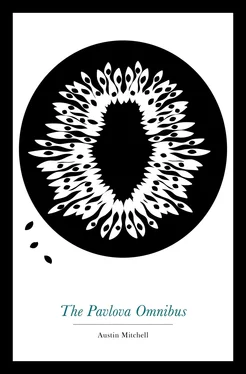Austin Mitchell - The Pavlova Omnibus
Здесь есть возможность читать онлайн «Austin Mitchell - The Pavlova Omnibus» — ознакомительный отрывок электронной книги совершенно бесплатно, а после прочтения отрывка купить полную версию. В некоторых случаях можно слушать аудио, скачать через торрент в формате fb2 и присутствует краткое содержание. Жанр: unrecognised, на английском языке. Описание произведения, (предисловие) а так же отзывы посетителей доступны на портале библиотеки ЛибКат.
- Название:The Pavlova Omnibus
- Автор:
- Жанр:
- Год:неизвестен
- ISBN:нет данных
- Рейтинг книги:5 / 5. Голосов: 1
-
Избранное:Добавить в избранное
- Отзывы:
-
Ваша оценка:
- 100
- 1
- 2
- 3
- 4
- 5
The Pavlova Omnibus: краткое содержание, описание и аннотация
Предлагаем к чтению аннотацию, описание, краткое содержание или предисловие (зависит от того, что написал сам автор книги «The Pavlova Omnibus»). Если вы не нашли необходимую информацию о книге — напишите в комментариях, мы постараемся отыскать её.
The Pavlova Omnibus — читать онлайн ознакомительный отрывок
Ниже представлен текст книги, разбитый по страницам. Система сохранения места последней прочитанной страницы, позволяет с удобством читать онлайн бесплатно книгу «The Pavlova Omnibus», без необходимости каждый раз заново искать на чём Вы остановились. Поставьте закладку, и сможете в любой момент перейти на страницу, на которой закончили чтение.
Интервал:
Закладка:
Now you understand party differences, don’t get obsessed by them. The fluctuations of the balance of payments and the state of livers at the IMF have more impact on Kiwi lives than the hue of the government. You will be exhorted to cast an ‘informed vote’. Read up on the candidates, their attitudes and backgrounds. Look at the history of the parties and the mail order catalogues they call manifestos. Then weigh up the policy and past performance of each party in the light of prevailing circumstances and the trends of the trade returns. Then boil all this information down into a choice of candidate. It’s impossible. Even a computer couldn’t do it—and it’s not had anything to drink.
You’ve fallen into the trap of taking what New Zealanders say at face value. The exhorters of informed voting don’t actually want you to think and investigate. They are merely anxious that you should vote the same way as they do. So walk into the polling booth and put yourself on automatic pilot. Your background will vote for you and if you try to vote against it you’ll merely end up voting for Social Credit or some other lunatic, or doodling hysterical patterns on the ballot paper while sobbing convulsively.
Having voted, don’t worry if your party doesn’t get in. Governments are very generous, more generous to their opponents than their supporters. This must be so, because when National is in, the farmers grumble continuously; in Labour periods, the Federation of Labour drowns out every other pressure group with its complaints. You see, when Labour is in office it is anxious to prove itself respectable so it does what it thinks National would have done. National wants to be popular so it doesn’t do what it really would like.
Also you must remember the basic characteristic of politicians: they are anxious to be loved. Katzengruber’s Law of Political Psychosis states that the basic drive to enter politics comes from psychological insecurity. This can spring from many causes. Whatever the source of their anxiety, capitalise on it. Nothing frightens them more than the threat of withdrawal of love. Write to them threatening this and you will get long explanations. Write to the papers with the same threat and you’ll get action. This is known as sensitivity to public opinion and it affects every institution of government. A fellow academic was once visiting the Governor of the Reserve Bank. In the centre of the gubernatorial desk, clipped, mounted and underlined, was a letter from that morning’s paper making suggestions on banking policy. It was signed, ‘Mother of Eight’.
Even if you don’t particularly like the government, remember that governments only take decisions in times of economic crisis. They then impose import controls or remove them, impose taxes or slash subsidies, depending on how the mood takes them. These periods of frenzied decisions leave such a backlog of hostility that the government spends the rest of its term anxiously appealing for love. No more decisions are made. Instead the government assumes the role of ringmaster adjudicating between competing pressure groups and trying to hurt their feelings as little as possible.
The pressure group melées are the real substance of Kiwi politics. All the big things are settled—homes, jobs, the Blue Streak. So the real political arguments are now about the little things—for and against compulsory hydatids dosing, whether large-mouthed bass should be introduced into the rivers, how many toheroas can be dug up. Over these the pressure groups struggle.
Like beasts, pressure groups come in many shapes and sizes. Biggest and most fearsome are the throwbacks to prehistoric days, the monsters. The Federation of Labour, the Manufacturers, the Chambers of Commerce, and Federated Farmers (which also runs the agriculture portfolio through a front organisation called the Department of Agriculture). Not quite as big but compensating by making as much noise are bodies like the RSA (motto: ‘Make war not love’) and the National Council of Women (‘Make scones not love’). Some are minute, like the family planning movement (‘Make love not children’) and the Campaign for Nuclear Disarmament, which favours unilateral abandonment of New Zealand’s massive nuclear stockpile. These are only random examples from the dense growth of pressure groups.
Pressure groups are intended to serve their members and give pleasures to their officers. These officials get a right to endless peregrination which keeps the skies black with pressure group officials ferrying from one conference centre to another. Without pressure group traffic NAC could slim its services down to a De Havilland Moth plying monthly between Auckland and Wellington. Officials also get access to the great, though like ministers, the more they see of public servants the more they grow to talk and think like them.
Pressure groups pursue these goals in various ways. Where necessary they will fight each other, a process which serves no useful purpose but gives a great deal of pleasure. ‘Federation of Labour unsympathetic to the needs of widow and orphan debenture holders’, announces Associated Chambers of Commerce. ‘Wharf workers near breadline,’ wittily replies the Federation. ‘New Zealand Federation of Sex Maniacs demands repeal of porn laws’ may yet become a headline. In the ‘good old days’, which like any other immigrant you will find ended just before you arrived, pressure groups were led by giants who enjoyed nothing so much as wrestling in verbal mud. Sir Hamilton Mitchell, A. P. O’Shea and F. P. Walsh were always good for a quote. Once when I interviewed Walsh he demanded to know whether I was ‘a Roman’ (candle presumably) before the interview began. He then went on to denounce opponents who had risen ‘from bogs to riches’. For some reason this was not in the final broadcast. In any case, though Hamilton Mitchell soldiers on, the giants have really been replaced by the blandness of the professional public relations men.
When not fighting, pressure groups can form coalitions. ‘Our members not getting a fair crack of the whip,’ say NZ Sadists’ Society and NZ Masochists’ Association in a joint demand for increased import quotas for instant whip. Most important of all, pressure groups have to cajole ministers. All have equal rights to earbash members of Cabinet. The Government, for its part, is anxious to co-operate. To go against any pressure group is to court a storm of protest and unpopularity. Ministers have therefore attempted the taming of the shrewd by keeping all the groups happy. Faced with problems, overseas governments take decisions. The New Zealand rulers call a conference of pressure groups:
1941 Stabilisation Conference
1960 Industrial Development Conference
1963 Export Promotion Conference
1964 Agricultural Production Conference
1968 National Development Conference
1984 Conference Promotion Conference.
As this technique is perfected and a higher standard of living provides more cake to share out, one can glimpse the ultimate system of non-government which will be perfected. Already all difficult decisions on road-building and spending have been handed over to the National Roads Board. More and more areas can be handed over in the same fashion. Finally, divested of all its responsibilities, the government can concentrate all its undistracted energies on its main concern and its most difficult job—being loved. The Kiwi art of politics will have reached its ultimate development: politics will have been completely excluded from politics.
*. The situation is typified by one Social Credit candidate who told an eager Press reporter in 1969: ‘As a man who during his life has worked on the railways and as a milk vendor, taxi driver, restaurant and piecart proprietor, he has come into contact with a great many people of all types … his grandfather was on the staff in Parliament Buildings.’ Unfortunately this wealth of experience was put to the service of the wrong party. The candidate was heavily beaten.
Читать дальшеИнтервал:
Закладка:
Похожие книги на «The Pavlova Omnibus»
Представляем Вашему вниманию похожие книги на «The Pavlova Omnibus» списком для выбора. Мы отобрали схожую по названию и смыслу литературу в надежде предоставить читателям больше вариантов отыскать новые, интересные, ещё непрочитанные произведения.
Обсуждение, отзывы о книге «The Pavlova Omnibus» и просто собственные мнения читателей. Оставьте ваши комментарии, напишите, что Вы думаете о произведении, его смысле или главных героях. Укажите что конкретно понравилось, а что нет, и почему Вы так считаете.












